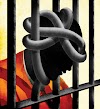BURDEN OF PROOF IN INSANITY AS A DEFENCE
In this article we have a tendency to need to signalize to whom the burden of proof rests wherever mental disease is ready up as a defence to associate indictment for any crime. The topic of mental disease is attracting such a lot attention larva in its medical and legal aspects, it's thus often relied upon as a defence to criminal prosecutions
The answer to it might rely upon what's meant by the phrase “Burden of Proof “. Under law, each man is likely to be of sound mind and assumed to possess a decent degree of reason to be chargeable for his acts unless the contrary is tested. Similarly, every one is additionally probable to understand the law. The prosecution doesn't ought to establish these facts.
In mental disease defence, there are 2 aspects of proving associate offense, that are as follows:
1.Commission of crime and
2.Insanity defence.
The burden of proving the commission of an offense is often on the prosecution, which never shifts. The prosecution must prove the same beyond a reasonable doubt. However, the worry of proving the existence of circumstances (Section eighty four IPC) for mental disease defence would air the suspect (Section one hundred and five of the evidence Act) and also the court shall presume the absence of such circumstances. The suspect must prove by inserting material before the court like knowledgeable proof, oral and alternative documentary proof, presumptions, admissions or maybe the prosecution proof, satisfying that he was incapable of knowing the character of the act or of knowing that what he was doing was either wrong or contrary to law.
The Supreme Court have determined that the crucial purpose of your time at that condition of mind ought to be established is that the time once the crime is truly committed and also the burden of proving this, lies on the appellant for claiming the advantage of the Section eighty four provision.
In Dahyabhai Chhaganbhai Thakker versus state of Gujarat, this court has command that albeit the suspect wasn't ready to establish once and for all that he was insane at the time he committed the offense, the proof placed before the court might raise an affordable doubt within the mind of the court as regards one or additional of the ingredients of the offense, as well as preparation of the suspect and therein case the court would be entitled to acquit the suspect on the bottom that the overall burden of proof resting on the prosecution wasn't discharged. although the burden is on the suspect, he's not needed to prove a similar on the far side all doubt, however just satisfy the preponderance of chances. The burden of proof casted upon him is not any beyond that rests upon a celebration to civil proceedings.
Plea of mental disease
The worry of proving condition of mind is on the suspect, therefore the plea of mental disease ought to be taken by the suspect or by his attorney or his relations or previous history of mental disease is unconcealed, it's the duty of associate honest investigation officer to subject the suspect to a medical checkup and place that proof before the court and if this can be not done, it creates a significant bad condition within the prosecution case and also the advantage of doubt must incline to the suspect. Hence, the plea of mental disease ought to be taken throughout the investigation or throughout the trial within the court not throughout the attractiveness to the upper court.
How Psychiatrists get entangled in Cases that Involve the mental disease defence
One way that psychiatrists get entangled in mental disease cases is through their patients. This could necessitate the unfortunate event wherever a patient is concerned in an exceedingly criminal matter. The patient and his or her counsel value more highly to create his or her state of mind at the time of the alleged incident a problem and you, because the treating medical practitioner, are known as to testify.
The other common method psychiatrists find yourself enjoying a task in these cases is as a adviser WHO is serving to guage the individual also because the circumstances of the crime. In such a case, you're truly seeing the person below a judicial writ or at the request of 1 of the attorneys, and it's quite completely different than seeing a patient, particularly once problems like confidentiality come back up.
What it suggests that once somebody is Found clean-handed by Reason of mental disease
When a litigator is found clean-handed by reason of mental disease it doesn't mean he or she essentially goes free. Commonly, states have necessities for treatment or institutionalization once such a finding. Some states need such confinement for the length of your time the person would have received if guilty as a minimum, thus he or she might find yourself defrayal longer confined than if he or she didn't raise such a defence. Like alternative areas of the law, this varies from state to state.
CONCLUSION
The medical discipline describes the patient’s intellectual standing on a time that ranges from very unwell to fully healthy. However, the legal language is clearly categorical in nature, either criminally accountable or not accountable. whereas a psychiatrist is involved with medical treatment of individual patients, courts are involved with the security of the society from the possible dangers from these patients.






0 Comments